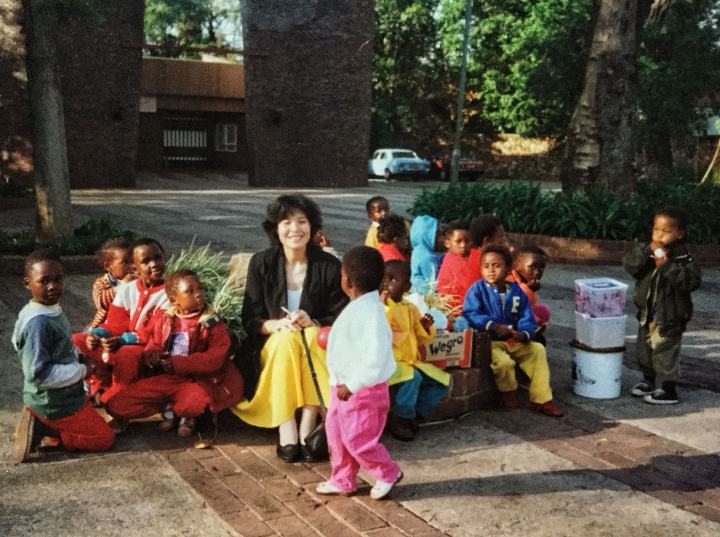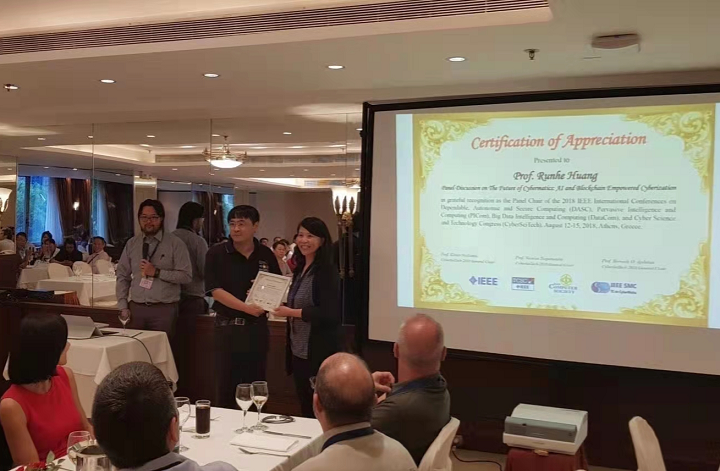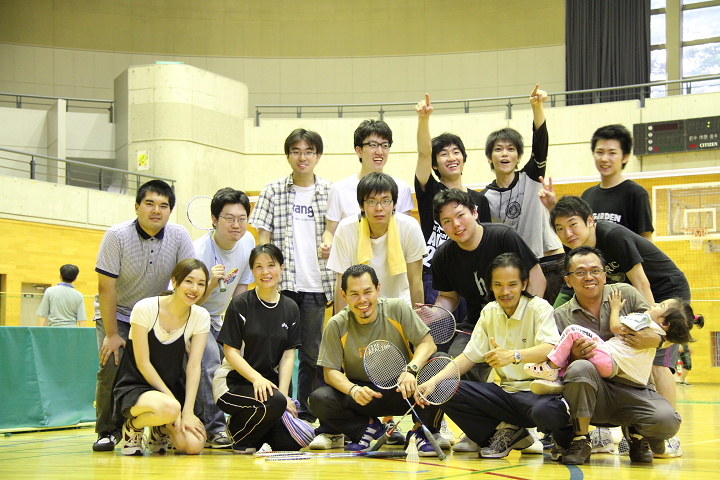reseach
Bringing AI to everyday life
Runhe Huang, Professor
Department of Computer Science, Faculty of Computer and Information Sciences
Posted July.15,2022
Faculty Profile
Professor Runhe Huang, a founding member of the Faculty of Computer and Information Sciences, has been working in the artificial intelligence (AI) field since 1982. Her current research projects involve making everyday life easier and more efficient with systems utilizing AI and information technology.
Systems solving problems like human experts
Specializing in the fields of AI and Computer Science, I started studying problem-solving expert systems in the field of information communication systems in 1982. These were a success in 80’s.
An expert system is AI software that can diagnose problems are in a complex system and provides solutions to the problems using human experts’ knowledge represented in rules. It emulates the problem-solving process of a human expert with two critical elements: a domain knowledge base and an inference engine. The knowledge base is accumulated expert knowledge data in the form of rules, and with which the interference engine analyzes a current situation or problem and offers solutions to problems quickly using the expert’ knowledge. However, a rule-based expert system has a critical limitation in that it becomes difficult and time-consuming to handle a large scale of knowledge data encoded in rules, in particular, when knowledge needs to be updated. To overcome this limitation, it is necessary to understand how humans learn cognitively and how knowledge is stored in the brain. I have focused my efforts on the study of associative memory modeling and the development of memory models for intelligent entities like robots. This is an interdisciplinary study and involves the fields of cognitive science, neuroscience, and psychology. Though rather challenging,it is a fascinating and rewarding research field.
Joining a newly-founded university has boosted my interest in education
I studied Electronics at university, when the field of computing was just coming into being. After using computers in my graduation research, I became interested in the field of Computer Science and started to turn my research focus to the study of Artificial Intelligence.
I joined the Faculty of Computer Science and Engineering, the University of Aizu as one of its founding faculty members in 1993. This experience set me on the path towards a career as an educator in the field of Computer Science.
The late Professor Toshiyasu Kunii, the first president of the University of Aizu, invited me, a fledgling researcher who had just obtained a PhD in the UK, to work for the University of Aizu. I accepted his invitation since I had been impressed by Professor Kunii’s global vision, and also by the orientation of the newly-founded University towards Computer Science, which would provide me with the invaluable experience of being a pioneering member of the first Japanese university to focus on computer and information science technologies.

Visiting Johannesburg, South Africa in 1994, and having a fun time with local kids while on a break from the international congress.
Furthermore, when Hosei University established its Faculty of Computer and Information Sciences in 2000, I was invited to join by Professor Kenji Omori, the first Dean of the new Faculty. I was the youngest researcher, and I was happy to have the opportunity to learn from all senior faculty members, in particular, receiving generous support from Dean Ohmori and Professor Kunii.
People are energetic and enthusiastic when they are striving for something new. Being surrounded by people with a fierce passion for education was a great stimulus, and I feel that I grew as an educator.
Having taught and researched at Hosei for over 20 years, I feel that the people I have met through Hosei are like a big family. Encouraging my students to be confident in the selection of their research topics has often felt like an almost familial duty and pleasure.

Moderating a panel talk at the IEEE Cyber Science and Technology Congress 2018, held in Greece
Placing effort into AI-based systems for improving people’s lives
In recent years, it is noticeable that a growing number of smart systems are aimed at making our lives more efficient, safer and easier. These systems are enabled by utilizing the Internet of Things (IoT) devices sensing our surroundings with which data is collected under information communications technology (ICT). The processing and analysis of collected data valuable insights for better supporting our lives, AI technologies play an important and indispensable role in this.
Currently, my research team includes graduation research students and graduate school students who have been working on a smart bathroom project. To collect data from a bathroom, we have adopted the use of Millimeter Wave Radar sensors and skeleton data sensing devices instead of surveillance cameras in order to address privacy concerns. The collected data, including vital signs and skeleton data, is processed by signal processing algorithms and analyzed by AI-related technologies. This project aims to detect some abnormal situations such as “heat shock” in a bathtub, slips and falls that occur during showering, and assessing the vital signs situation after a fall, so as to facilitate appropriate medical treatment. Particularly, some situations need to be handled immediately among the elderly due to the greater risk of fatality.
In the system we are building, data from the millimeter wave radar sensors can measure the heart rate, breathing frequency, and other vital signs after going through the signal processing. With this analysis, the system can detect changes that indicate abnormalities. According to the situation, the system will automatically take subsequent steps, such as calling an ambulance and informing a family member. If the system comes into common use, all the techniques and technologies pioneered in this smart bathroom project can be applied to the developments of other practical smart systems handling tasks such as taking constant care of babies and infants, looking after the elderly, providing health care at nursing facilities and keeping pets.
To make the system applicable to all, we have to repeat our experiments innumerable times, all the while accumulating more data, and further fine-tuning the accuracy of analysis. If possible, we hope to enter into cooperation with industry sectors to bring the system into widespread use.

The laboratory has a pleasant atmosphere. Before the COVID-19 pandemic, its members held a sports day event as a team-building activity. International students participated in the event with their families and played table tennis and badminton together.
Runhe Huang, Professor
Department of Computer Science, Faculty of Computer and Information Sciences
Runhe Huang studied electronics at the National University of Defense Technology, China, and graduated from the university with a bachelor's degree in science. She served as lecturer at the National University of Defense Technology. She went to the UK, studied computer science and mathematics at the University of the West of England, and obtained a Ph.D. in computer science. She was engaged in launching the Faculty of Computer Science and Engineering at the University of Aizu, which opened in 1993, and worked there as an assistant professor. She became an associate professor of the Faculty of Computer and Information Sciences, Hosei University in 2000, when the faculty was founded. Currently she is a professor, first appointed in 2003. She holds membership in the Association for Computing Machinery (ACM) and the Institute of Electrical and Electronics Engineers (IEEE). She chaired the Smart World Technical Committee, the IEEE Computational Intelligence Society, from 2019 to 2020.

